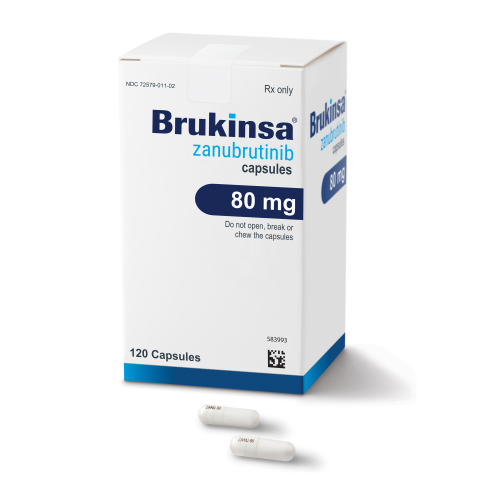CAMBRIDGE, Mass. & BEIJING– BeiGene, Ltd. (NASDAQ: BGNE; HKEX: 06160), a global biotechnology company focused on developing and commercializing innovative medicines worldwide, today announced that BRUKINSA® (zanubrutinib) has received accelerated approval from the U.S. Food and Drug Administration (FDA) for the treatment of adult patients with relapsed or refractory (R/R) marginal zone lymphoma (MZL) who have received at least one anti-CD20-based regimen.
This accelerated approval is based on overall response rate (ORR). Continued approval for this indication may be contingent upon verification and description of clinical benefit in a confirmatory trial.
“We are excited about the FDA’s approval for BRUKINSA in patients with previously treated marginal zone lymphoma, a significant milestone that was made possible by the diligent BeiGene team, the dedicated investigators, and the participating patients and their families. The MAGNOLIA trial results provided additional evidence that the selective design of BRUKINSA can be translated to improved treatment outcomes for these patients,” said Jane Huang, M.D., Chief Medical Officer, Hematology at BeiGene. “The ongoing evaluation of BRUKINSA in its broad global clinical program will enable us to further understand this potentially best-in-class BTK inhibitor and its impact on patients. Since the initial FDA approval in November 2019, BRUKINSA has been granted 12 approvals in four indications globally. We will continue to execute on our mission to improve access to innovative and quality treatments for cancer patients worldwide.”
“BTK plays a critical role in B-cell receptor signaling, a driver in the development of marginal zone lymphoma. In the MAGNOLIA trial, BRUKINSA demonstrated impressive overall response and complete remission rates, with responses observed in all MZL subtypes. In addition, this next-generation BTK inhibitor was well-tolerated in these patients, with low rate of discontinuation due to adverse reactions. We are optimistic that BRUKINSA will bring clinically meaningful benefit to patients with relapsed or refractory marginal zone lymphoma,” said Stephen Opat, FRACP, FRCPA, MBBS, Director of Clinical Hematology at Monash Health, Head of Department of Hematology at Monash University, and lead principal investigator of the MAGNOLIA trial.
“The approval of BRUKINSA offers patients with relapsed and refractory marginal zone lymphoma a new treatment option and new hope for improving patient outcomes,” commented Meghan Gutierrez, Chief Executive Officer of the Lymphoma Research Foundation.
The FDA approval of BRUKINSA is based on efficacy results from two single-arm clinical trials, with ORR as assessed by independent review committee (IRC) per 2014 Lugano Classification as the primary endpoint.
In the multicenter, pivotal Phase 2 MAGNOLIA trial (NCT03846427) in patients with R/R MZL who received at least one anti-CD20-based regimen, a total of 66 patients were evaluated, including 26 with extranodal subtype, 26 with nodal subtype, 12 with splenic subtype, and four with unknown subtype. Based on assessment using CT scan, the ORR was 56% (95% CI: 43, 68) with a complete response (CR) rate of 20%; based on assessment prioritizing PET-CT scan, the ORR was 67% (95% CI: 54, 78) with a CR rate of 26%. The median duration of response (DoR) was not reached at the median follow-up time of 8.3 months, with 85% of responders still in remission at 12 months (95% CI: 67, 93). Responses were observed in all MZL subtypes.
In the global Phase 1/2 trial of BGB-3111-AU-003 (NCT02343120), a total of 20 patients were evaluated, including nine with extranodal subtype, five with nodal subtype, and six with splenic subtype. Based on assessment using CT scan, the ORR was 80% (95% CI: 56, 94) with a CR rate of 20%. The median DoR was not reached at the median follow-up time of 31.4 months, with 72% of responders still in remission at 12 months (95% CI: 40, 88).
The most common (≥30%) adverse reactions, including laboratory abnormalities, in the pooled safety population of 847 patients were decreased neutrophil count, upper respiratory tract infection, decreased platelet count, hemorrhage, decreased lymphocyte count, rash, and musculoskeletal pain.
The recommended dose of BRUKINSA is either 160 mg twice daily or 320 mg once daily, taken orally with or without food. The dose may be adjusted for adverse reactions and reduced for patients with severe hepatic impairment and certain drug interactions.


